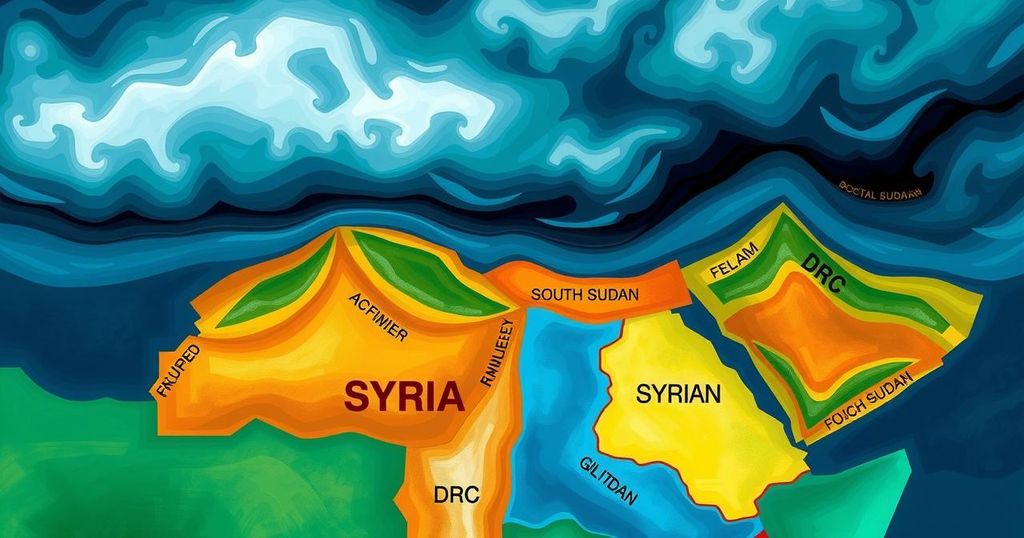Urgent Humanitarian Crises Across Regions Call for Immediate Action

The article highlights urgent humanitarian crises in various regions: Gaza faces renewed air strikes, prompting calls for a ceasefire; Syria continues to receive aid amidst violence; the DRC experiences deadly clashes driving displacement; escalating violence in South Sudan displaces thousands; and Tropical Storm Jude significantly affects Southern Africa, prompting emergency responses.
In the Occupied Palestinian Territory, UN relief chief Tom Fletcher emphasized the need for a ceasefire in Gaza as air strikes resumed, creating a climate of fear for civilians. The UN Office for the Coordination of Humanitarian Affairs (OCHA) reported numerous fatalities, including children, amidst the bombardments. Humanitarian Coordinator Muhannad Hadi condemned the violence and called for immediate cessation of hostilities and resumption of humanitarian support to address the critical needs of the population.
Fletcher stressed the importance of allowing humanitarian aid and commercial items into Gaza, warning that ongoing blockades significantly jeopardize survival for those reliant on aid. He highlighted the benefits seen during the previous 42-day ceasefire, during which over 4,000 aid trucks entered Gaza, providing assistance to more than 2 million people. Fletcher stated, “We cannot and must not accept a return to pre-ceasefire conditions or the complete denial of humanitarian relief.”
The situation remains dire as evacuation orders have been issued in parts of Gaza, risking further displacement without guarantees for the safety of civilians. Medical evacuations have been halted, exacerbating the humanitarian crisis. Thousands of children are currently deprived of educational opportunities as many schools across Gaza have ceased operations.
In Syria, the UN and its partners are maintaining humanitarian aid efforts in the face of ongoing violence. They have successfully restored water supplies and provided food and winter aid to vulnerable populations. The Emergency Relief Coordinator, Tom Fletcher, recently attended a conference where he urged donor nations for urgent support, having seen €5.8 billion pledged for relief efforts.
The humanitarian situation in the Democratic Republic of the Congo is worsening due to ongoing conflicts. Violence has forced over 100,000 people to flee into safer provinces, with reports of significant civilian casualties. OCHA highlights the limited presence of aid workers, indicating an urgent need for increased funding to address the growing humanitarian needs in affected areas.
In South Sudan’s Upper Nile State, escalating violence has resulted in the displacement of approximately 50,000 individuals since late February, severely impacting humanitarian operations. Humanitarian Coordinator Anita Kiki Gbeho called for the protection of civilians and aid workers, stressing the necessity for funding to address ongoing humanitarian needs, which are severely underfunded.
Finally, in Southern Africa, nearly 420,000 people have been impacted by Tropical Storm Jude, causing extensive damage to infrastructure and displacing thousands in Madagascar, Malawi, and Mozambique. The UN mobilized resources to facilitate responses, including search and rescue operations and emergency support for those affected while remaining aware of potential health crises stemming from the storm.
The situation across multiple regions, including the Occupied Palestinian Territory, Syria, the Democratic Republic of the Congo, South Sudan, and Southern Africa, underscores a critical humanitarian crisis requiring urgent international attention and funding. Key figures such as UN relief chief Tom Fletcher stress the importance of ceasefires, humanitarian access, and protective measures for civilians amid ongoing conflicts and natural disasters. The immediate need for sustained humanitarian aid and support is paramount to alleviate the suffering of millions affected by violence and environmental catastrophes.
Original Source: www.unocha.org







